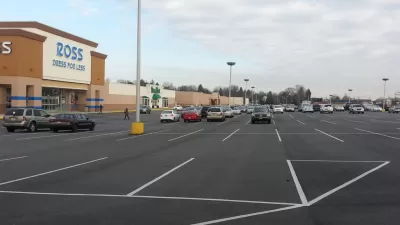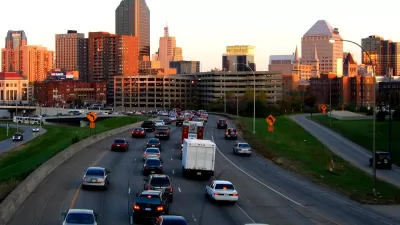Minimum parking requirements, argues Michael Manville, raise the cost of construction and eat up valuable urban real estate.

In a piece for The Atlantic, Michael Manville, associate Urban Planning professor at UCLA's Luskin School of Public Affairs, argues that minimum parking requirements "have been a disaster" for cities. Manville quotes Lewis Mumford, who in the 1960s decried the urban focus on parking as "the right to destroy the city." According to Manville, parking requirements have caused "needless damage," over decades, "with few people even noticing."
Cars, Manville writes, consume space—even when the car is not in motion or even present. "Cities designed for cars must set aside space: space to wait for cars, and space to hold them while they wait for their drivers to come back." Parking minimums take the cost of parking "and push it onto developers, hiding it in the cost of building." In Los Angeles, one parking spot can add as much as $50,000 to the cost of a building.
"Because parking requirements make driving less expensive and development more so, cities get more driving, less housing, and less of everything that makes urbanity worthwhile." Fulfilling local leaders' visions of "walkable downtowns and affordable units" requires eliminating the long-standing parking requirements that undermine them. "America’s disastrous experiment with parking requirements," writes Manville, "should end."
FULL STORY: How Parking Destroys Cities

Alabama: Trump Terminates Settlements for Black Communities Harmed By Raw Sewage
Trump deemed the landmark civil rights agreement “illegal DEI and environmental justice policy.”

Planetizen Federal Action Tracker
A weekly monitor of how Trump’s orders and actions are impacting planners and planning in America.

The 120 Year Old Tiny Home Villages That Sheltered San Francisco’s Earthquake Refugees
More than a century ago, San Francisco mobilized to house thousands of residents displaced by the 1906 earthquake. Could their strategy offer a model for the present?

In Both Crashes and Crime, Public Transportation is Far Safer than Driving
Contrary to popular assumptions, public transportation has far lower crash and crime rates than automobile travel. For safer communities, improve and encourage transit travel.

Report: Zoning Reforms Should Complement Nashville’s Ambitious Transit Plan
Without reform, restrictive zoning codes will limit the impact of the city’s planned transit expansion and could exclude some of the residents who depend on transit the most.

Judge Orders Release of Frozen IRA, IIJA Funding
The decision is a victory for environmental groups who charged that freezing funds for critical infrastructure and disaster response programs caused “real and irreparable harm” to communities.
Urban Design for Planners 1: Software Tools
This six-course series explores essential urban design concepts using open source software and equips planners with the tools they need to participate fully in the urban design process.
Planning for Universal Design
Learn the tools for implementing Universal Design in planning regulations.
Clanton & Associates, Inc.
Jessamine County Fiscal Court
Institute for Housing and Urban Development Studies (IHS)
City of Grandview
Harvard GSD Executive Education
Toledo-Lucas County Plan Commissions
Salt Lake City
NYU Wagner Graduate School of Public Service





























